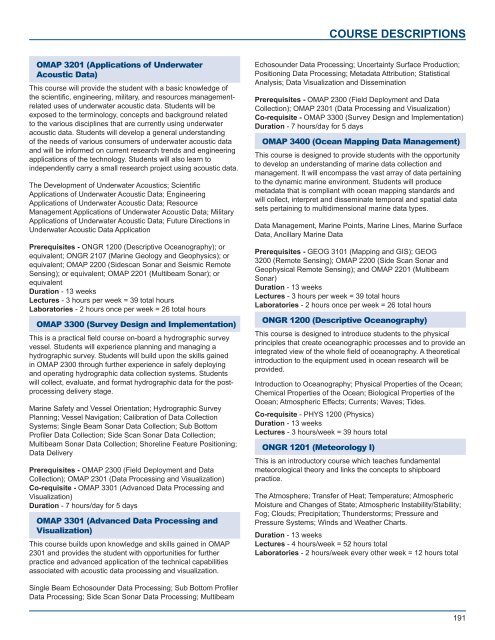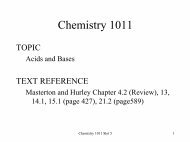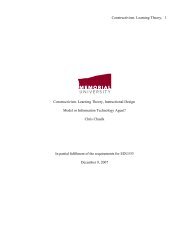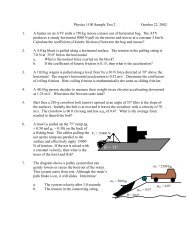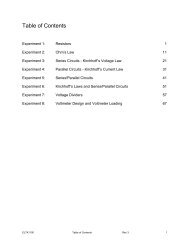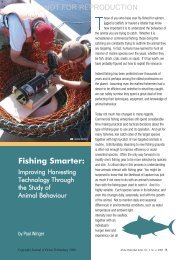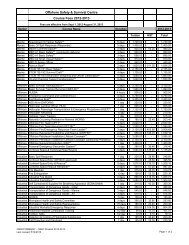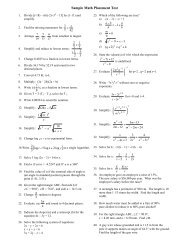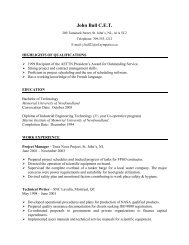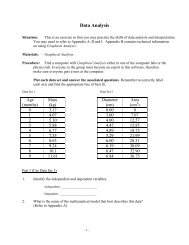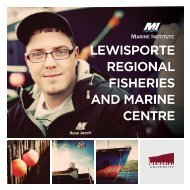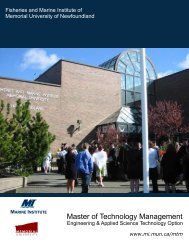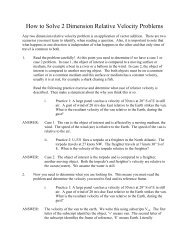Academic Calendar - Fisheries and Marine Institute - Memorial ...
Academic Calendar - Fisheries and Marine Institute - Memorial ...
Academic Calendar - Fisheries and Marine Institute - Memorial ...
You also want an ePaper? Increase the reach of your titles
YUMPU automatically turns print PDFs into web optimized ePapers that Google loves.
COURSE DESCRIPTIONS<br />
OMAP 3201 (Applications of Underwater<br />
Acoustic Data)<br />
This course will provide the student with a basic knowledge of<br />
the scientific, engineering, military, <strong>and</strong> resources managementrelated<br />
uses of underwater acoustic data. Students will be<br />
exposed to the terminology, concepts <strong>and</strong> background related<br />
to the various disciplines that are currently using underwater<br />
acoustic data. Students will develop a general underst<strong>and</strong>ing<br />
of the needs of various consumers of underwater acoustic data<br />
<strong>and</strong> will be informed on current research trends <strong>and</strong> engineering<br />
applications of the technology. Students will also learn to<br />
independently carry a small research project using acoustic data.<br />
The Development of Underwater Acoustics; Scientific<br />
Applications of Underwater Acoustic Data; Engineering<br />
Applications of Underwater Acoustic Data; Resource<br />
Management Applications of Underwater Acoustic Data; Military<br />
Applications of Underwater Acoustic Data; Future Directions in<br />
Underwater Acoustic Data Application<br />
Prerequisites - ONGR 1200 (Descriptive Oceanography); or<br />
equivalent; ONGR 2107 (<strong>Marine</strong> Geology <strong>and</strong> Geophysics); or<br />
equivalent; OMAP 2200 (Sidescan Sonar <strong>and</strong> Seismic Remote<br />
Sensing); or equivalent; OMAP 2201 (Multibeam Sonar); or<br />
equivalent<br />
Duration - 13 weeks<br />
Lectures - 3 hours per week = 39 total hours<br />
Laboratories - 2 hours once per week = 26 total hours<br />
OMAP 3300 (Survey Design <strong>and</strong> Implementation)<br />
This is a practical field course on-board a hydrographic survey<br />
vessel. Students will experience planning <strong>and</strong> managing a<br />
hydrographic survey. Students will build upon the skills gained<br />
in OMAP 2300 through further experience in safely deploying<br />
<strong>and</strong> operating hydrographic data collection systems. Students<br />
will collect, evaluate, <strong>and</strong> format hydrographic data for the postprocessing<br />
delivery stage.<br />
<strong>Marine</strong> Safety <strong>and</strong> Vessel Orientation; Hydrographic Survey<br />
Planning; Vessel Navigation; Calibration of Data Collection<br />
Systems; Single Beam Sonar Data Collection; Sub Bottom<br />
Profiler Data Collection; Side Scan Sonar Data Collection;<br />
Multibeam Sonar Data Collection; Shoreline Feature Positioning;<br />
Data Delivery<br />
Prerequisites - OMAP 2300 (Field Deployment <strong>and</strong> Data<br />
Collection); OMAP 2301 (Data Processing <strong>and</strong> Visualization)<br />
Co-requisite - OMAP 3301 (Advanced Data Processing <strong>and</strong><br />
Visualization)<br />
Duration - 7 hours/day for 5 days<br />
OMAP 3301 (Advanced Data Processing <strong>and</strong><br />
Visualization)<br />
This course builds upon knowledge <strong>and</strong> skills gained in OMAP<br />
2301 <strong>and</strong> provides the student with opportunities for further<br />
practice <strong>and</strong> advanced application of the technical capabilities<br />
associated with acoustic data processing <strong>and</strong> visualization.<br />
Echosounder Data Processing; Uncertainty Surface Production;<br />
Positioning Data Processing; Metadata Attribution; Statistical<br />
Analysis; Data Visualization <strong>and</strong> Dissemination<br />
Prerequisites - OMAP 2300 (Field Deployment <strong>and</strong> Data<br />
Collection); OMAP 2301 (Data Processing <strong>and</strong> Visualization)<br />
Co-requisite - OMAP 3300 (Survey Design <strong>and</strong> Implementation)<br />
Duration - 7 hours/day for 5 days<br />
OMAP 3400 (Ocean Mapping Data Management)<br />
This course is designed to provide students with the opportunity<br />
to develop an underst<strong>and</strong>ing of marine data collection <strong>and</strong><br />
management. It will encompass the vast array of data pertaining<br />
to the dynamic marine environment. Students will produce<br />
metadata that is compliant with ocean mapping st<strong>and</strong>ards <strong>and</strong><br />
will collect, interpret <strong>and</strong> disseminate temporal <strong>and</strong> spatial data<br />
sets pertaining to multidimensional marine data types.<br />
Data Management, <strong>Marine</strong> Points, <strong>Marine</strong> Lines, <strong>Marine</strong> Surface<br />
Data, Ancillary <strong>Marine</strong> Data<br />
Prerequisites - GEOG 3101 (Mapping <strong>and</strong> GIS); GEOG<br />
3200 (Remote Sensing); OMAP 2200 (Side Scan Sonar <strong>and</strong><br />
Geophysical Remote Sensing); <strong>and</strong> OMAP 2201 (Multibeam<br />
Sonar)<br />
Duration - 13 weeks<br />
Lectures - 3 hours per week = 39 total hours<br />
Laboratories - 2 hours once per week = 26 total hours<br />
ONGR 1200 (Descriptive Oceanography)<br />
This course is designed to introduce students to the physical<br />
principles that create oceanographic processes <strong>and</strong> to provide an<br />
integrated view of the whole field of oceanography. A theoretical<br />
introduction to the equipment used in ocean research will be<br />
provided.<br />
Introduction to Oceanography; Physical Properties of the Ocean;<br />
Chemical Properties of the Ocean; Biological Properties of the<br />
Ocean; Atmospheric Effects; Currents; Waves; Tides.<br />
Co-requisite - PHYS 1200 (Physics)<br />
Duration - 13 weeks<br />
Lectures - 3 hours/week = 39 hours total<br />
ONGR 1201 (Meteorology I)<br />
This is an introductory course which teaches fundamental<br />
meteorological theory <strong>and</strong> links the concepts to shipboard<br />
practice.<br />
The Atmosphere; Transfer of Heat; Temperature; Atmospheric<br />
Moisture <strong>and</strong> Changes of State; Atmospheric Instability/Stability;<br />
Fog; Clouds; Precipitation; Thunderstorms; Pressure <strong>and</strong><br />
Pressure Systems; Winds <strong>and</strong> Weather Charts.<br />
Duration - 13 weeks<br />
Lectures - 4 hours/week = 52 hours total<br />
Laboratories - 2 hours/week every other week = 12 hours total<br />
Single Beam Echosounder Data Processing; Sub Bottom Profiler<br />
Data Processing; Side Scan Sonar Data Processing; Multibeam<br />
191


